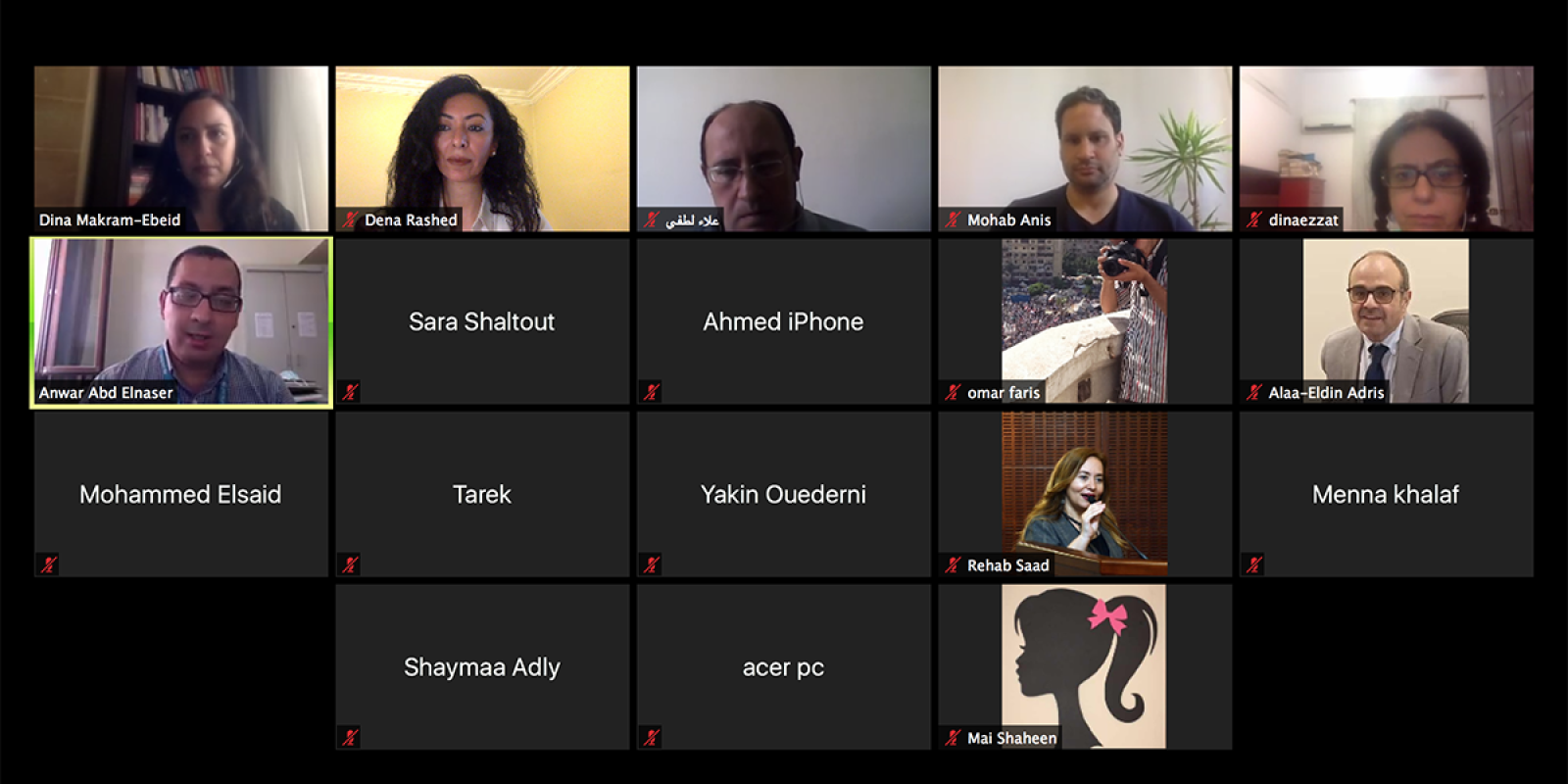
AUC Holds Third Virtual Media Discussion on Pandemic and Post-Pandemic Research and Innovation Initiative
AUC's third Virtual Media Discussion centered on the Pandemic and Post-Pandemic Research and Innovation Initiative.
The initiative awarded funding to 10 different research projects that are aimed at creating an impact both during and after the global COVID-19 pandemic. Speakers were Alaa El Din Adris, associate provost for research, innovation and creativity, Mohab Anis, professor of electronics and communication engineering, Dina Makram-Ebeid, assistant professor of sociology and Anwar Abd El Naser, assistant professor at AUC’s Institute of Global Health and Human Ecology.
“Out of 26 proposals, 10 were chosen for funding. The selected projects span a number of disciplines, including physics and biology, psychology and sociology, education, business management and more,” said Adris.
Adris added that there is an urgent need for greater understanding of not only the health, the biological and epidemiological side of the crisis, but also the societal and people’s side during the crisis and, even more importantly, the post-pandemic change.
The discussion addressed three of the ten projects:
Transitioning from 6 Feet Apart to Working 6 Feet Together: An In-depth Analysis and Roadmap to Business Growth in the Realm of COVID-19
PI: Mohab Anis, professor of electronics and communication engineering. CO-PI: Sherwat Elwan, associate professor of management and Nouri Sakr, associate professor of computer science and engineering.
This project aims at creating a model that defines the various forces that affect businesses at times of crisis. One goal of this project is to develop a roadmap as a business solution for survival and growth with a long-term objective of sustainability rather than a limited timely analysis of resilience under COVID-19.
"We are currently seeing turmoil in the business sector and a state of uncertainty, whether at the social or economic level, so we are studying the forces affecting the private sector in general and the services sector in particular,"Anis said.
He added that the study also provides a set of innovation principles for companies to revive their business model, grow again, and rehire employees after the pandemic. Additionally, these principles could help companies gain a competitive advantage for their products and services, especially with the surge in internet usage, representing a good opportunity for companies to develop their businesses.
“The study started by focusing on the sectors most affected by the pandemic and those affected positively," he said. "The timeframe of the project is eight months.”
Social Protection in Egypt: Mitigating the Socio-Economic Effects of the COVID 19 Pandemic on Vulnerable Employment
PI: Dina Makram-Ebeid, assistant professor of sociology. CO-PI: Amr Adly, assistant professor of political science, Hania Sholkamy, associate professor at AUC’s Social Research Center, Samer Atallah, associate professor of economics and associate dean of the School of Business and Nadine Sika, associate professor of political science.
This research highlights interventions in four main areas in Egypt: Employment Security, Social Assistance, Health Insurance and Gendered Protection.
"The project aims to identify the socio-economic effects of the pandemic on informal workers, one of the most vulnerable groups. We are also working with eight academic and non-academic experts specializing in these areas. Our goal is to issue four policy recommendations in August to share with the various stakeholders and hold a workshop for each part of the project,” Makram-Ebeid said.
One part of the research, which studies the social protection of informal workers, focuses on the pandemic's economic impact on domestic violence.
"We are also looking at social benefits such as the social protection program Takaful and Karama (among other projects) and their economic impact on Egypt’s budget," Makram-Ebeid added. "We are also studying how social benefits reach families and the role of local councils in reaching those in need.”
ACE-2 and TMPRSS2: The Achilles heel(s) of the SARS-coronavirus 2 (SARS-CoV-2)
PI: Anwar Abd ElNaser, assistant professor at the Institute of Global Health and Human Ecology (IGHHE). CO-PI: Hassan El-Fawal, dean of the School of Sciences and Engineering and founding director of IGHHE, Ahmad Mostafa, assistant professor of biology, Mohamed Salama, associate professor at IGHHE and Mostafa Yousef, assistant professor of mechanical engineering.
This research studies enzymes which impact the ability of the virus to enter the lungs in an attempt to explain the different prevalence and mortality of the pandemic between both sexes and in Egyptians compared to other countries. It also aims to design amino acid sequences that may prevent the entry of the virus into the lungs.
"We study at AUC’s Institute of Global Health and Human Ecology racial differences in susceptibility to infection, including genetic mutations in some enzymes that the virus needs to enter the cell, like ACE-2 and TMPRSS2 enzymes," Abd ElNaser said.
He added,"What we are trying to study now is whether there are genetic mutations in the Egyptian people that lead to a decrease in infection. We are doing this study computationally, based on data from 1000 healthy Egyptian people and comparing it with the genetic map of different countries."
The project's first research paper is expected to be published next September, and the study will extend until next May.
For regular updates from the University during coronavirus visit www.aucegypt.edu/coronavirus
For more information about the university news and events follow us on Facebook.
